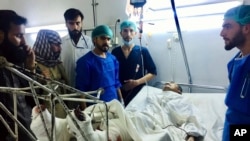Explosions ripped through two separate passenger vehicles in northern Afghanistan on Thursday, killing at least nine people and injuring 13 others.
The bombings took place within minutes of each other in different parts of Mazar-e-Sharif, the capital of Balkh province, said Mohammad Asif Waziri, a provincial police spokesman.
"The targets appear to be Shiite passengers," Waziri said.
The Islamic State terrorist group’s regional affiliate, Islamic State Khorasan Province (ISIS-K), claimed responsibility for the bomb blasts. It is the latest in a series of bombings to rattle Afghanistan this month, killing dozens of people and injuring scores of others.
Last week, a bomb exploded at a Shiite Muslim mosque in Mazar-e-Sharif, killing 12 worshippers and wounding about 90 others. A day later, a bomb exploded inside a packed mosque in northeastern Kunduz province during Friday prayers, killing 33 people and injuring nearly 50 others.
While ISIS-K claimed responsibility for the mosque bombing in Mazar-e-Sharif, no one has yet claimed the Kunduz attack.
ISIS-K has stepped up its attacks against the Hazara community since the Taliban retook control of Afghanistan in August 2021. The United States and coalition troops withdrew from the country later that month, ending their almost 20 years involvement in the war with the Taliban.
Up to 10% of the country’s estimated 40 million people are Afghan Hazara. The community is considered the most persecuted minority group in Afghanistan and is discriminated against by many in the Sunni-majority country.
ISIS-K is a Sunni-based militant group like the Islamist Taliban, but the two are bitter foes.
The Taliban reiterated in a statement this week that their security forces have almost eliminated the ISIS-K threat in Afghanistan, saying efforts are ongoing to dismantle the terror group’s few remaining hideouts.
But domestic and foreign critics remain skeptical about those claims. They note that IS militants have demonstrated their ability to strike at will anywhere in the country and pose a key challenge for the Taliban to maintain national security and address terrorism-related concerns of Afghanistan’s neighbors, as well as the world at large.
Some information for this report came from Agence France-Presse.







